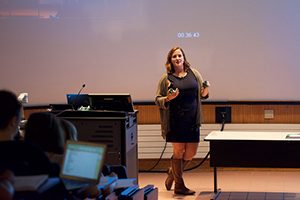
Morghan Lemmenes / Winonan
Students explored ideas brought up in “Jurassic Park” with Francis Mann during her talk “Hacking the Human Condition: Using Biotechnology to Predict and Design Personalized Treatments for Human Diseases” on Wednesday, Sept. 21.
“Her talk is on the way you can use genetic information and the newly available technology for mapping individual people genomes and using that information to develop new medications that are specifically targeted towards one person,” David Speetzen said, head of the CLASP Lecture Series.
Mann discussed the difference between genome sequencing and genotyping tests and with how the technology is advancing, we could predict the life span of a newborn baby.
By using genotyping, people are able to use their DNA to see if they have any number of diseases such as Huntington’s Disease and Cystic Fibrosis because companies, such as 23andMe, are selling kits for people to take their DNA sample to send it in for a DNA screening.
If there is a mutation in the DNA sequence, the mutation could lead to a particular disease. However, genotyping is not completely thorough.
“If the company decided not to screen for that particular mutation, you won’t find out about it. If you have a different mutation in the same gene, you won’t find out about it. You will only find out about the targets the company decided to sell you,” Mann said.
With the technology advances, the process of genotyping does not take as long as it used to take. By having computers, DNA can be read faster than it was first read in 1977.
This means that as fast as technology is evolving, there might come a time where mothers will find out what type of diseases their newborn baby will face during their lifetime and when their child will die.
Not only will this be able to predict a lifetime of diseases, but also could help develop medicines.
“[Technology advances] hav the potential of changing the way we practice medicine on a whole bunch of different fronts,” Speetzen said.
Genotyping and genome sequencing will become the light at the end of the tunnel, if technology keeps developing.
Mann left the students wondering if they would choose to know the specific day they would die or live their life not knowing.
With the way technology is advancing and with genotyping being able to detect diseases and read DNA, dinosaurs could roam the earth once again in a real life “Jurassic Park.”
-By Morghan Lemmenes





























































